“We were so low that when my chute opened, I swung twice and hit the ground. I know that all the men didn’t get out. If they did, they were too low and their chutes never had time to open.”
Bill Oatman, U.S. paratrooper for the 506th Parachute Infantry Regiment, gives his personal account of what it was like to make the jump into enemy territory on D-Day:
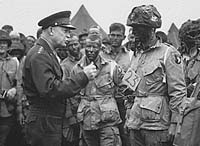
General Dwight D. Eisenhower gives the order of the Day: “Full victory-nothing else” to paratroopers in England before they board their airplanes to participate in the 1st D-Day assault. Source: U.S. National Archives.
We were loaded on a train and went to Swindon. There, we went by truck to Auburn Wilkes. I don’t remember the dates when we arrived in England or in the village of Aldbourne. We hit it off with the people in the village, but they didn’t understand the way we spent our money. We told them we couldn’t take it with us where we were going, so we might as well spend it and enjoy it.
We were at our highest pitch in training by the time D-Day came that we would go into town just spoiling for a good fight. It didn’t matter who it was, just so we could blow off some steam. One day, we were loaded onto trucks, and we were taken to an area that was all fenced in and guarded by MP’s, and we were told to behave ourselves and start checking our equipment for the big jump.
I don’t remember how long we were in the guarded area, but we started getting instructions and started studying maps and photographs of the whole area where we were going to jump.
By the time it came time to jump, I think every man could have run around the whole area where we were supposed to jump blindfolded, but it didn’t work out like it was planned. the war was over, I wrote a letter home to my mother, but I had to leave so much out because I knew how upset she already was, but now that she’s gone, I can come out with some things that I know would have upset her real bad. I still have my French ID identity card that the French underground gave me, and also a letter from Fred Astaire’s sister, who wrote home to my mother to let her know I was OK after D-Day. I will now start reading the letter I sent home, and when I get to some parts, I will fill in with what I couldn’t put in the letter to her.
The list I have of what I jumped with is not what every man jumped with. The sergeant picked one man from each squad to carry what I have listed. On June 5, the officers told us we could go to a show that was close by. We didn’t suspect anything, so we went. When we got back, around 6:00 P.M., they told us to get our things together, whatever we were going to jump with.
The following is a list of what I jumped with. I had all this stuff packed in a bag that looked like a barracks bag that was tied to a rope about 20 feet long and tied to the bottom of my harness. There were 2 straps that went around my leg, and I was supposed to pull a cord to release the bag from my leg after my chute opened.
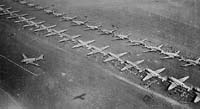
Twin lines of C-47 transport planes are loaded with paratroopers of the First Allied Airborne Army and equipment at an airfield taking off for Holland.(September 17, 1944). Source: U.S. National Archives.
In all, it weighed around 110-150 pounds. That was just the weight of the bag when it was loaded, and it was the following items: 3 boxes of machine gun ammo (each box had 250 rounds in it), 6 hand grenades (they would later come in handy), my back pack or small bag –it had all my toilet equipment in it and change of underwear, 35 packs of cigarettes, 100 sticks of chewing gum that my mother had sent me, and 12 candy bars.
On top of the bag, I had a knife that looked like a banana knife. It was called a machete, to be used to cut telephone lines or any other thing that could delay the enemy. Also on top of the bag, I had a land mine for tanks or trucks, plus 10 clips of rifle ammo.
I had a knife strapped on my leg, a belt full of ammo, which held 9 clips. As to clothing, I had on my jump suit with all the pockets filled with K-rations and hand grenades. I had long underwear plus my dress uniform on because it was damp and chilly.
We went out to the planes about 8:00 P.M. and laid around and smoked and talked. When we jumped, it was 1:14 A.M. in the morning. Thank God with a bag strapped on my leg, I was the 3rd man out the door, because our plane was hit and a wing was on fire.
We were so low that when my chute opened, I swung twice and hit the ground. I know that all the men didn’t get out. If they did, they were too low and their chutes never had time to open.
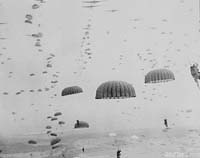
Parachutes open overhead as waves of paratroops land in Holland during operations by the 1st Allied Airborne Army. Source: U.S. National Archives.
When my chute opened, it opened with a jerk and the bag that I had strapped on my leg took off and I never did find it. After landing, I crawled out of the field to the edge of the road and used my cricket. Every man was given a cricket to make contact with each other after landing, that way the Germans didn’t know what was going on until we hit them.
When I cricketed, I got an answer from across the road, and a Mexican boy came over to me. He asked me where I landed, and I pointed over my shoulder, and he said, “Jesus, how lucky can you get.” I turned and looked where he pointed, and there on the fence was a big sign — ACHTUNG MEINEN (German for ‘Attention’). I had landed right in the middle of that field, took off my helmet and threw it away because I couldn’t hear anything with it on, and I crawled out of there without setting a mine off.
About 20 minutes later, we met Bill Hayes, and the 3 of us set out Kraut hunting. About a half an hour later, while we were lying in a gully figuring which way to go to meet up with our
company, we heard some noise and about 8 or 10 Krauts came running towards our gully. When they got to the gully, they split up and ran up both sides. We had pulled the pins on our
grenades, so we just waited until they got pretty well past us, then we threw the grenades and took off in the other direction.
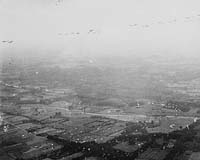
A fleet of Allied aircraft flies overhead as paratroopers of the Allied Airborne Command float groundward in the invasion of the Netherlands, still another step towards the liberation of Europe. Source: U.S. National Archives.
I know we got a few of them, because of all the screaming and hollering. A little later, while walking across the field, someone hollered, “Halt!” I was in the lead, so I pumped a few shots in the direction from where the yell came from, and we 3 hit the swampy ditch that we were walking along the side of. We got out of there and kept moving.
Whenever we’d come across any wires, we’d cut them. If it would have been daylight, the Germans could have followed us very easy just by following the cut lines. We had a few more running fire fights until daybreak, and then we spotted a farm house. A few French kids came out from the house to the barnyard where they had seen us and brought us some bread and wine. We didn’t know French and they didn’t know English, but they saw the American flags that some of the guys had sewn on their jackets, and they knew who we were.
We got out our maps and they pointed where we were and which direction would be best, but we didn’t trust them, and we went another way, but we soon realized that we should have listened. We got out in the middle of a field, and a shot went by my ear. I said to Hayes and Sanchez, “Let’s keep going and see if we can spot the guy.”
When the second shot rang out, we hit the ditch filled with swamp water. We spotted from where the shots had come from, so we returned the fire. After a few shots, we find out it’s another trooper. Well, the 4 of us started out of there, and we ran into what looked like the whole German army in front of us.
Between the four of us and the Germans, we had quite a battle till we ran out of ammunition, and the Mexican boy got hit 3 times.
Well, we were then taken prisoner and they stripped us of everything. They took us to a farmhouse where we saw some other wounded paratroopers and some of our boys hanging in trees still in their chutes with their privates cut off. That was the final straw.
We had our minds made up then that if we got out of there, there would be no prisoners taken by us nowhere. From there, they walked us about 3 miles to a small village, and threw
us into a pig pen with a couple of pigs.
The pigs looked at us and went over in a corner and lay down. I don’t blame them. I guess we did look a little rough. We had our hair cut like an Indian, and real short, had stove-black all over our faces and we stank worse than the pigs from being in all that swamp water.
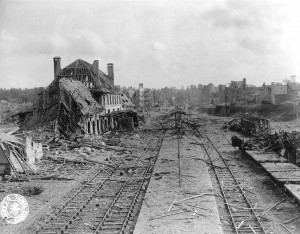
Railway station and city of Saint-Lô destroyed after the Invasion of Normandy. Source: U.S. National Archives.
We stayed there about 2 hours, then they walked us to St. Lo, where I met Joe Dolo and Chuck Cunningham. They held us in a big barn next to a very large cathedral or a church. That night, St. Lo was bombed, and I thought that was the end of about six or eight hundred prisoners. The next morning when the Germans took us out of the barn, we looked around and everything was flattened except the church and the barn where we had been held.
The Germans then marched us about 10 miles to a monastery of some kind. By this time, we were getting pretty hungry. The Germans were also short of food, so they shot and butchered a few horses.
As a manner of getting to see one another, we got together in groups and there were 11 men from B-Company there. The Germans also gave us some hot water and some leaves of some kind and told us it was soup. We were marched out of there, and went to a town called Allenson, and it was a regular prisoner of war camp.
The commander of the camp had us fall out and told us he was putting us to work. There would be 10 men to a group with one guard. If one man either escapes or tries to escape, the other 9 would be shot. Our group got lucky. We got an old man for a guard that had been in World War I and he loved his booze. We also had a Company B man that was from Hamburg, Pennsylvania that spoke Pennsylvania Dutch, so he and the old man could make out what each other was saying in German.
The old man told us to watch for any German officers or staff cars while he went looking for whatever he could find in the bombed out houses. We knew he was going looking for booze, so we waited till he got out of sight, then we went looking also.
Some of the guys looked for vegetables in the gardens in the backyards of the bombed out houses, and some of us went looking for other things. We found a wine cellar, so we took off our jump jackets and snapped the sleeves shut. We then put 2 bottles in each sleeve and turned the jackets inside out and slung them over our shoulder like we were hot after digging for the unexploded bombs and just took them off to cool off.
When we got back to camp, we made a big pot of stew out of what the other guys had found, and after eating, we all got drunk on the wine. Man, was that camp commander mad. He
wouldn’t let us go out of camp on any more details. It didn’t make us mad because some of the guards were trigger happy, and you never knew when one of them might shoot you.
Next, the Germans took us to another prison camp. It was outside a town called Chartres. In that prison camp, there were around 2,000 South Africans or French Moroccans. Man, were they dirty people. They were very friendly people though. They were getting Red Cross packages and they slipped a few things out through a drain pipe to us.
We left there and went into Paris to be loaded onto a train. On the way to the train, there were about 2 dozen civilians that were on the German’s side, and they kicked and spit on us.
jumped out of line to punch one and the German guard pricked me in the butt with his bayonet. It didn’t draw blood but I knew it was there…
Find out more about Bill Oatman’s World War II experience here.
Comment |

 Share on Facebook
Share on Facebook
 Tweet
Tweet
 Add My Story
Add My Story






